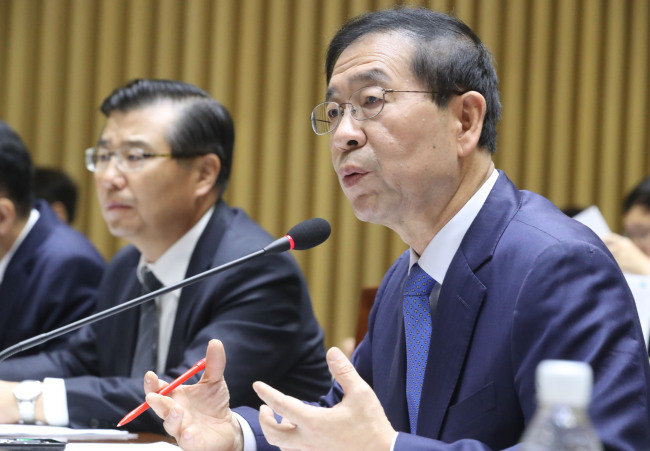Opposition politicians Thursday heaped blistering criticism on President Park Geun-hye and her ruling camp over the allegation that the presidential office created a blacklist of dissenting artists to deny them state support.
Seoul Mayor Park Won-soon, whose supporters in art circles were allegedly included in the blacklist, urged the National Assembly to investigate the scandal, saying that if found to be true, President Park should be impeached.
“I can’t tolerate it anymore. If the same thing had happened in western democracies, their Cabinet would have stepped down,” said Park on his Facebook account. “It reminded me of Watergate. It is the epitome of power abuse.”
The main opposition Minjoo Party of Korea’s former leader Moon Jae-in joined the criticism, denouncing the scandal as something that makes the government “feel ashamed” and shows “how ignorant” the Park administration has been about cultural affairs.
 |
Seoul City Mayor Park Won-soon. Yonhap |
Their fiery remarks came after the revelation that Cheong Wa Dae instructed government agencies, such as the Art Council Korea in charge of implementing cultural policies, to cut off financial and logistical support to entities related to artists listed in the backlist.
The 100-page document, obtained exclusively by local daily Hankook Ilbo on Wednesday, includes a total of 9,473 artists, most of whom had supported Mayor Park’s 2014 run to become mayor and Minjoo Party leader Moon’s bid for the 2012 presidential election.
Some artists were on the list for criticizing the government’s dealing with the sinking of Sewol in 2015, which left 295 dead and nine missing. Among them were Park Chan-wook, a renowned director who won the Grand Prix award at the 2004 Cannes Film Festival for his film “Oldboy.”
Rep. Do Jong-hwan of the Minjoo Party of Korea, one of the first lawmakers to have raised the allegation, increased the pressure on the government. The poet-turned-politician had leaked the minutes of a closed-door meeting among the ACK leadership who appeared to acknowledge the existence of the black list.
“We have seen so many allegations and suspicions pouring out,” said Do in an interview with local media. “We need to get to the bottom of the scandal and find out how far Cheong Wa Dae has been involved with this.”
Cheong Wa Dae and the government denied the allegation. Presidential Spokesperson Jeong Yeon-guk said Wednesday that he was told the scandal “was not true” by the Ministry of Culture, Sports and Tourism who oversees government agencies including the ACK.
When asked Thursday by the lawmakers at the Education, Culture, Sports and Tourism Committee during the annual parliamentary audit, Culture Minister Cho Yoon-son testified before lawmakers that “there was no such blacklist.”
Outraged over the mounting censorship scandal, civic groups and art communities asserted that the scandal would constitute grave violation of freedom of speech and demanded the government promptly investigate.
Cultural Action, a nonprofit organization advocating cultural diversity, said in a statement that the legislative body should hold a special hearing and that the government should dismiss officials embroiled in the scandal.
It is not the first time that the Park administration has faced scrutiny over censorship. Over the past four years, the government has been accused of censoring art content depicting the president and her policies in a negative fashion over contentious issues
In 2013, “Project Cheonan Ship,” a movie that challenged the government’s claim that North Korea had torpedoed South Korea’s warship Cheonan in 2010, was suspended by multiplex chain Megabox as the Defense Ministry and conservative civic groups filed an injunction to ban the film’s release.
In August, South Korea’s pop artist Leeha was fined for satirizing President Park by distributing leaflets critical of President Park Geun-hye multiple times across the country. The artist depicted the president as a deranged women wearing a flower in a poster titled “Wanted. Mad Government.”
“Government censorship tactics are getting sophisticated,” said Lee Youn-take, a theater director who claimed he was on the blacklist for endorsing former opposition party leader Moon jae-in during his 2012 presidential campaign.
“Back in the ’70s, the authorities’ censorship mostly involved physical abuse or threats of violence. But now it is involved with everyday life. Censorship has existed throughout time. What has been changed is its method,” he said.
By Yeo Jun-suk (
jasonyeo@heraldcorp.com)








